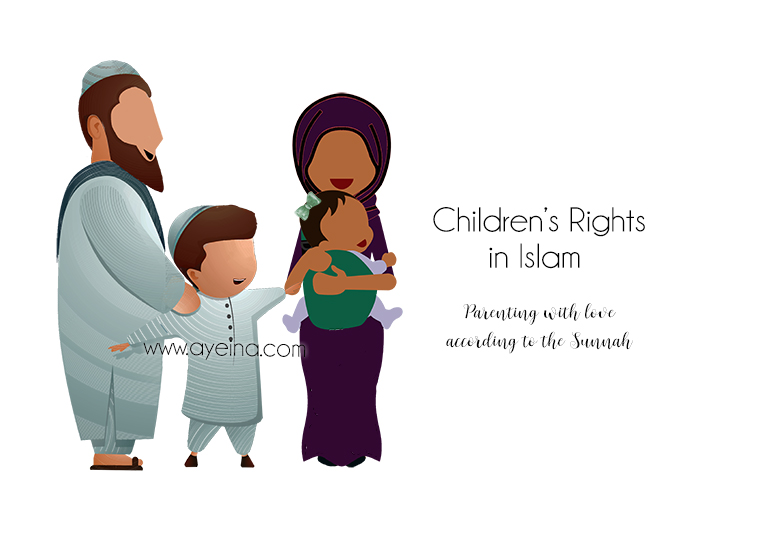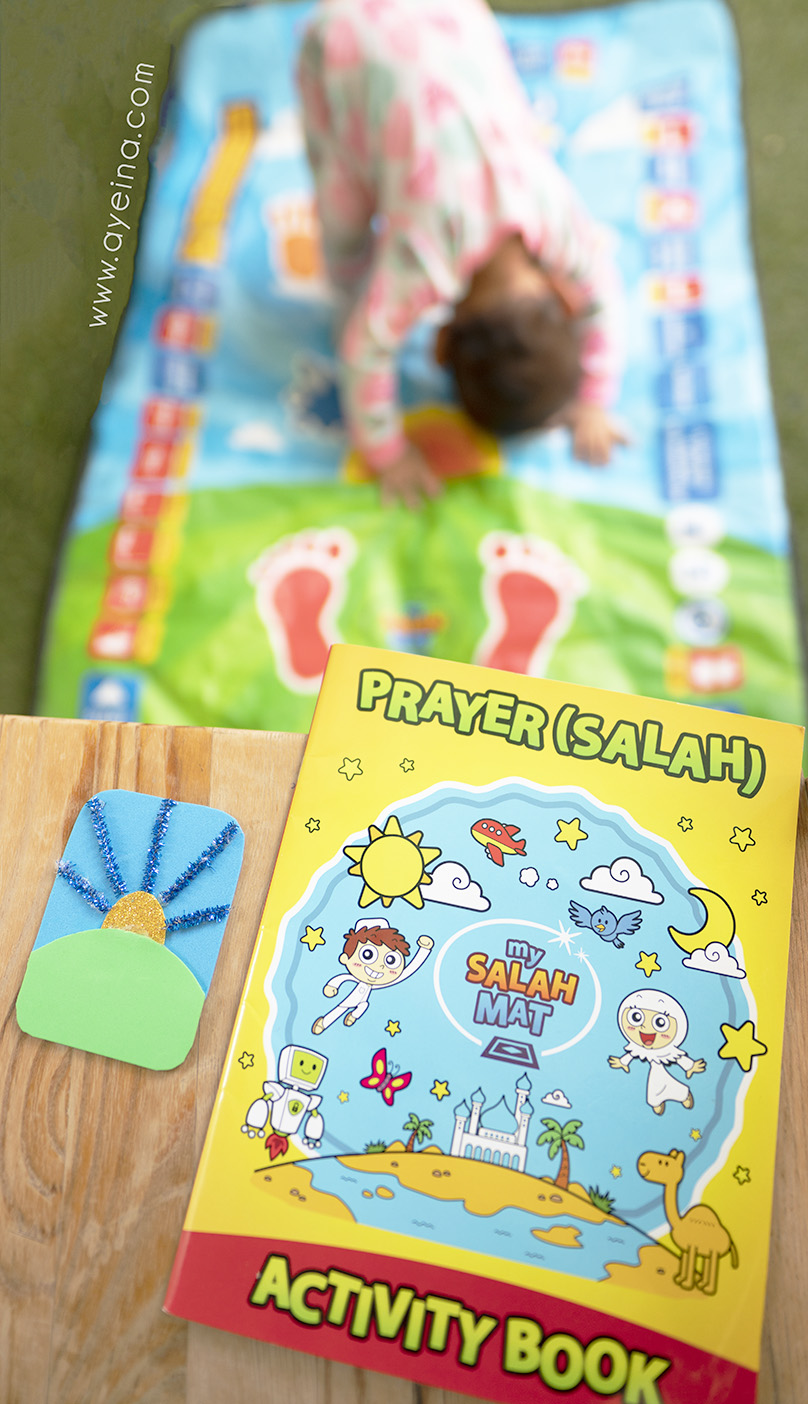How your child expresses his or her love for you depends on how you express your love for him or her. You are the role model for your child. When you express your love, it improves your relationship with that person. She or he will feel confident in your love. There’s nothing like being loved to boost self-esteem. There are many different ways to express your love. You can do it both verbally and physically. The Sunnah of prophet Muhammad ﷺ constantly shows us how he was not only expressive in terms of love with his wives and friends, but also with the children. So following are some ways you can emulate the Sunnahs of Rasool Allah (ﷺ) and see your relationship with the kids blossom in shaa Allah.how we behave as adults often depends on how we were raised as kids.
Messenger of Allah (ﷺ) said: “When one of you loves his brother, then let him inform him of it.” [Tirmidhi](NOTE: Although the plural of “sunnah” سنة in Arabic is “sunan” سنن and not sunnahs, but this is simply for ease of those who are not aware of the intricacies of the Arabic language and hence do not understand the word sunan whenever it’s written).

1) Speak your love
I know, you – as a parent – do everything for your children and that should be considered love, right? But consider expressing your love as following a Sunnah and in shaa Allah it will get easier to express more.
By saying “I love You” more often
Allah’s Messenger (ﷺ) asked thrice, “Where is the small (child)?” Then he said, “Call Al-Hasan bin `Ali.” So Al-Hasan bin `Ali got up and started walking with a necklace (of beads) around his neck. The Prophet (ﷺ) stretched his hand out like this, and Al-Hasan did the same. The Prophet (ﷺ) embraced him and said, “0 Allah! l love him, so please love him and love those who love him.” [Bukhari]
The first thing that easily comes to mind when you think of telling someone that you love them is to say “I love you”. Three simple little words that are sometimes so hard to say but can have the power to strengthen relationships into a tight bond. If you love your children (and of course you do), then let them know through words as well. Say “I love you” often.
Through positive affirmations
Other ways to verbally express your love is to give positive affirmations such as “You are a loving son/daughter” and “Your love brightens my day”. Also give positive feedback that tells your child what you love about him/her. This can be said with “I appreciate your help” and “I love it when you hug me” etc. Try this and you will not only see your kids generally open up to you more but express their love more as well.
2) Show your love
Reassuring physical touch can make a huge difference – one of the reasons Allah has given us a skin that can feel. Physical expressions of love includes touches such as kissing, hugging, patting of backs, stroking of heads, holding or squeezing of hands. It also includes non-touches such as encouraging gestures like the thumbs up and the smiling and a look in the eye. Allah’s Messenger ﷺ showed his affection for them in many ways. He hugged them and patted them on the back. He touched their heads, combing their hair with his fingers etc.
Through Kisses
“…Allah’s Messenger (ﷺ) took Ibrahim (his son) and kissed him and smelled him…” [Bukhari]
The following hadith shows how kissing your children has been related to the amount of mercy and kindness you have in your heart.
‘A’isha (Allah be pleased with her) reported that there came a few desert Arabs to Allah’s Messenger (ﷺ) and said: Do you kiss your children? He (ﷺ) said: Yes. Thereupon they said: By Allah but we do not kiss our children. Thereupon Allah’s Messenger (ﷺ) said: Then what can I do if Allah has deprived you of mercy? … [Muslim]
And love isn’t exclusive to small children only.
Al-Bara added: I then went with Abu Bakr into his home (carrying that saddle) and there I saw his daughter `Aisha lying in a bed because of heavy fever and I saw her father Abu Bakr kissing her cheek and saying, “How are you, little daughter?” [Bukhari]
View this post on Instagram
Through Hugs
‘Aishah (May Allah be pleased with her) reported: Zaid bin Harithah came to the Messenger of Allah ﷺ when he was in my house. Zaid knocked at the door. The Prophet ﷺ rose to receive him, trailing his garment. He embraced and kissed him. [Tirmidhi]
The following hadith shows how Prophet (ﷺ) would love children of all creeds, race/color as well – Usama bin Zaid was the son of an Abyssinian slave woman Umm Ayman and freed-slave Zaid bin Haarithah (RA).
Narrated Usama bin Zaid: Allah’s Messenger (ﷺ) used to put me on (one of) his thighs and put Al-Hasan bin `Ali on his other thigh, and then embrace us and say, “O Allah! Please be Merciful to them, as I am merciful to them. ” [Bukhari]
3) Give them respect
Respect is a two-way street and when you choose to model mutual respect, you’ll be well on your way to raising respectful children in shaa Allah.`A’isha, the Umm al-Mu’minin, said, “I did not see anyone who more resembled the Messenger of Allah, may Allah bless him and grant him peace, in manner of speaking than Fatima. When she came to him, he stood up for her, made her welcome, kissed her and had her sit in his place. When the Prophet came to her, she stood up for him, took his hand, made him welcome, kissed him, and made him sit in her place. She came to him during his final illness and he greeted her and kissed her.” [Al-Adab Al-Mufrad 971]It’s a perfect example of how kids treat parents based on how they are treated because we, as parents, are their first school of love. in a world where we lack common courtesies, how can we teach our kids to be respectful?! Both respectful to us and to other kids and adults? The answer is that WE have to model the respect we hope to see from our kids. When children feel valued and capable, they are less likely to engage in power struggles.
READ: Sunnahs of Expressing Love to Your Parents
4) Give them gifts
As parents, we’re always buying things for our children. Giving gifts is not about the material accumulation of toys and clothing or about satisfying our child’s whims and fancies for the latest things. Instead, it should be about the giving with love – whatever you give! Especially giving of our love.
If you give your child a toy, then make sure you spend time to play that toy with her. If you give your child a book, then make sure you sit and read that book to or with him. It’s more about the love that you can both share with that gift. Children often crave your attention more than the gift itself.Anas ibn Malik said, “A woman came to ‘A’isha and ‘A’isha gave her three dates. She gave each of her two children a date and kept one date for herself. The children ate the two dates and then looked at their mother. She took her date and split it into two and gave each child a half of it. The Prophet, may Allah bless him and grant him peace, came and ‘A’isha told him about it. He said, ‘Are you surprised at that? Allah will show her mercy because of her mercy towards her child.'” [Al-Adab Al-Mufrad]
Prophet (ﷺ) said, “Give gifts and you will love one another.” [Al-Adab Al-Mufrad]
Gift of loving nicknames/Kunya
Prophet (ﷺ) used to call people around him with love – he would call them with the names and kunya that they liked best. For eg: Calling Zainab bint Salamah (his step-daughter) as “Zuwaynib”, calling Ali (RA) as “Abu Turaab”, calling Aishah (RA) as “Aish” or “humayrah” etc.Maintaining justice while giving gifts
We as Muslims should be conscious about treating our sons and daughters equally and justly.Allah’s Messenger (ﷺ) said, ‘Be afraid of Allah, and be just to your children.’ [Bukhari]
5) Spend quality time together
Anas ibn Malik walked by some children and greeted them. He said, “The Prophet, may Allah bless him and grant him peace, used to do that.” [Al-Adab Al-Mufrad]
When you spend quality time with your child, it tells him/her that you love being with him/her. Being able to spend time with your loved ones is crucial to any relationship. I’ll reiterate here that children crave their parent’s attention – whether negative or positive attention. Most of the time parents give their children negative attention by focusing on what their children shouldn’t do. This will only reinforce the negative action. Parents should instead focus on giving children their positive attention. One way to do this is to spend quality (and even quantity) time together.
It was narrated that Abu Taiyah said: “I heard Anas Bin Malik say: The Messenger of Allah (ﷺ) used to mix with us so much that he said to a little brother of mine: “O Abu `Umair, what happened to the Nughair (one of the narrators Waki` said that it means a bird that he used to play with).” [Ibn Majah]
Play / Pray with them
Children don’t understand hidden love. Express your love openly for them in every little thing. Children thrive during play instead of being burdened with too much organisation and extra-curricular activities. Prophet Muhammad (ﷺ) would have fun with the children, make them laugh and play with them – Sunnah encourages simplicity; a simple life with plenty of time to play.
The Prophet (ﷺ) was always patient and considerate with children.
Narrated Mahmud bin Rabi`a: “When I was a boy of 5, I remember, the Prophet (ﷺ) took water from a bucket (used for getting water out of a well) with his mouth and threw it on my face.” [Bukhari]
It was narrated from ‘Abdullah bin Shaddad, this his father said: “The Messenger of Allah (ﷺ) came out to us for one of the nighttime prayers, and he was carrying Hasan or Husain. The Messenger of Allah (ﷺ) came forward and put him down, then he said the Takbir and started to pray. He prostrated during his prayer, and made the prostration lengthy.” My father said: “I raised my head and saw the child on the back of the Messenger of Allah (ﷺ) while he was prostrating so I went back to my prostration. When the Messenger of Allah (ﷺ) finished praying, the people said: “O Messenger of Allah (ﷺ), you prostrated during the prayer for so long that we thought that something had happened or that you were receiving a revelation.’ He said: ‘No such thing happened. But my son was riding on my back and I did not like to disturb him until he had enough.'” [Nasai]
There is a famous saying attributed to Ali Ibn Ṭâlib that you should play with your children until they are seven years old, then teach them for the next seven, and befriend them for the next seven years.
Ya’la ibn Murra said, “We went out with the Prophet, may Allah bless him and grant him peace, and we were invited to eat. Husayn was playing in the road and the Prophet, may Allah bless him and grant him peace, raced the people and then spread out his arms. The boy began to run this way and that and the Prophet made him laugh until he caught hold of him. He put one of his hands under his chin and the other on his head and then embraced him… [Al-Adab Al-Mufrad]
6) Be patient with them
The Prophet (ﷺ) took a child in his lap for Tahnik (i.e. he chewed a date in his mouth and put its juice in the mouth of the child). The child urinated on him, so he asked for water and poured it over the place of the urine. [Bukhari]
So instead of getting annoyed for what the child has done (or being angry at the mother), he simply solved the situation. Prophet’s tolerance towards children tells how he never expected children to act like adults. He knew that children take time to grow and learn – and this is a process of Allah – to let life grow slowly and steadily. So when you feel angry (which is very natural), follow THESE steps.
Instead of shouting at a small child to not touch an object or to stay away from a dangerous area, all the while being ignored by the child and then subjecting them to long monologues and lectures to correct their mistakes, physically removing them from harm and then briefly explaining the whys of it is more effective.
Dates used to be brought to Allah’s Messenger (ﷺ) immediately after being plucked. Different persons would bring their dates till a big heap collected (in front of the Prophet). Once Al-Hasan and Al-Husain were playing with these dates. One of them took a date and put it in his mouth. Allah’s Messenger (ﷺ) looked at him and took it out from his mouth and said, “Don’t you know that Muhammad’s offspring do not eat what is given in charity?” [Bukhari]
When our kids constantly see us angry with them because of what they did wrong, either they brand themselves as a bad kid (which is deterrent to their positive growth) or they simply brand us as a bad parent in their mind (which is deterrent to our positive relationship with them).
Prophet Muhammad (ﷺ) would use a combination of physical touch and gentle reprimanding words to make kids realize their mistakes. He knew that it is natural for little kids to get distracted from an errand by other children’s street games.
The Prophet (ﷺ) said, “The best women are the riders of the camels and the righteous among the women of Quraish. They are the kindest women to their children in their childhood and the more careful women of the property of their husbands.” [Bukhari]
Anas said: the Messenger of Allah (ﷺ) was one of the best of men in character. One day he sent me to do something, and I said: I swore by Allah that I would not go. But in my heart I felt that I should go to do what the Prophet of Allah (ﷺ) had commanded me; so I went out and came upon some boys who were playing in the street. All of a sudden the Messenger of Allah (ﷺ) who had come up behind caught me by the back of the neck, and when I looked at him he was laughing. He said: Go where I ordered you, little Anas. I replied: Yes, I am going, Apostle of Allah! Anas said: I swear by Allah, I served him for 7 or 9 years, and he never said to me about a thing which I had done: Why did you do such and such? Nor about a thing which I left: why did not do such and such? [Abi Dawud]
Let Go…
Narrated Um Khalid: (the daughter of Khalid bin Sa`id) I went to Allah’s Messenger (ﷺ) with my father and I was wearing a yellow shirt. Allah’s Messenger (ﷺ) said, “Sanah, Sanah!” (`Abdullah, the narrator, said that ‘Sanah’ meant ‘good’ in the Ethiopian language). I then started playing with the seal of Prophethood (in between the Prophet’s shoulders) and my father rebuked me harshly for that. Allah’s Messenger (ﷺ) said. “Leave her,” and then Allah’s Messenger (ﷺ) (invoked Allah to grant me a long life) by saying (thrice), “Wear this dress till it is worn out and then wear it till it is worn out, and then wear it till it is worn out.” (The narrator adds, “It is said that she lived for a long period, wearing that (yellow) dress till its color became dark because of long wear.”) [Bukhari]Know that love is in little things. Sometimes it’s in words. Sometimes it’s in hugs and kisses. Sometimes it’s in gifts. Sometimes it’s in smile and laughter. Sometimes it’s in letting go! So much of the peaceful parenting lies in letting go… Letting go of the mess they make in the area you just cleaned Letting go of the wall they painted out of creative curiosity. Letting go of the book they drew on out of imaginative spur. Letting go of the bad grades they scored in school And the list goes on… Remember that angels are not even writing their “sins” yet (till they aren’t adults), even if they deliberately break a precious piece of crockery, or touch anything in our cupboards or drawers that we have kept strictly off limits – but they are surely writing YOUR words and actions.
The idea of letting go is to find solutions together. It doesn’t mean spoiling your child, but it simply means not spoiling ourselves in the process. Not burying our kind souls in the process. Not forgetting to be patient in the process. Not losing our temper in the process…
————————————————————————————————————
Co-Author’s Bio: Jameela Ho is a mother of two children and a teacher of young children. She helps parents to form close relationships with their children. Click this link to get her free ebook ‘The Family Fun Activities Guide’ to grow and form strong bonds with your children in fun ways.——————————————————————————————————







LOVEEEEDD THIS! JazakumAllahu khairan!
Jazakillah khairan katheera habibti ❤
Wonderful and enlightening article. I love how a narration of hadith has come to establish every point. It makes me feel very closer to Nabi SAW and the salafus Saliheen. You feel very connected to them. May Allah reward the author and Ayeina team for producing such excellent and wonderful articles.
jazakillah khairan katheera 🙂 Muhammad (saws) was indeed a mercy to mankind and a perfect example for us to follow! <3
Barak Allah feekum ❤️ very nice article. The part where while children sins are not counted, ours are, resonated with me the most.
It’s kinda scary, isn’t it! :s when we are shouting at kids, it’s usually our own anger and frustration that surfaces up unfortunately. May Allah help us stay patient and loving.
your write up on parenting is so nice. It accomplished knowledge. please refer proper reference with full book name, page number, hadith number
Jazakillah khairan katheera. Each hadith is embedded in the underlined reference where you’ll be able to read the Arabic version of it as well. Nothing on this website is quoted without a reference link embedded in it. So always check the purple underlined links. Hope that helps.
Jazakallah, your blogs are always full of knowledge and wisdom. Being parents we should show love and respect for our beloved parents so that kids also do the same. I have bought several books for my kids that include short stories about the life of Prophet Muhammad (PBUH) and his love for kids. Goodnight Stories from the Life of the Prophet Muhammad is a highly recommended book for kids as a bedtime storybook.